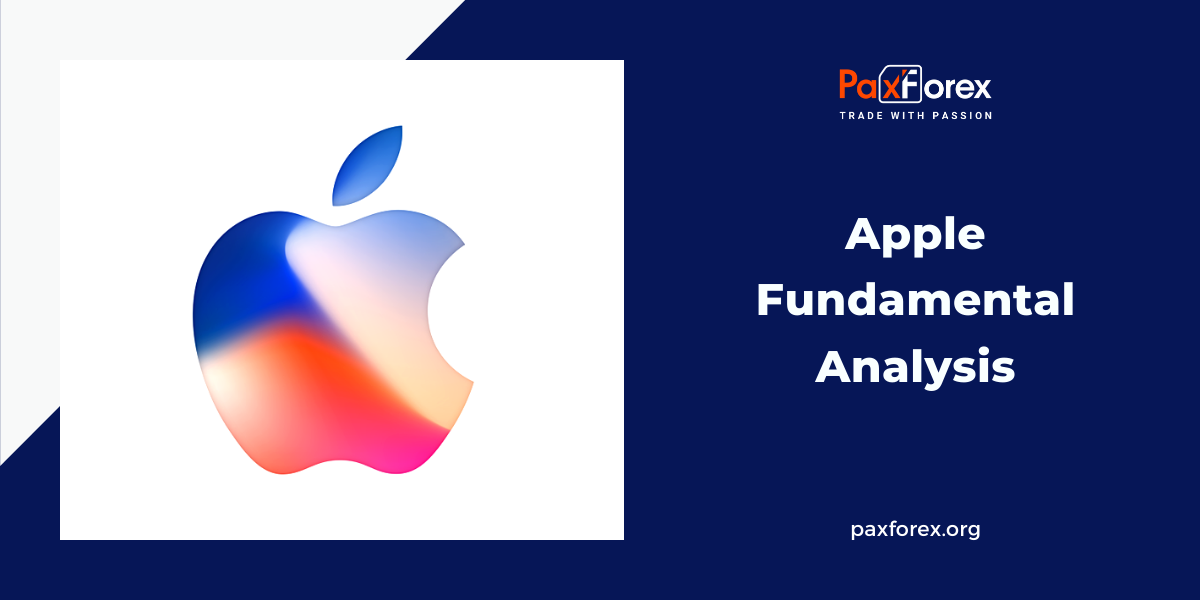
Source: PaxForex Premium Analytics Portal, Fundamental Insight
As one of the world's premier businesses, Apple has predictably emerged as one of the most lucrative investment opportunities. Over the past three years alone, the company's stock has surged by an impressive 46%, easily outperforming the 22% gain of the Nasdaq Composite index.
Even in the current year, Apple continues to surpass the broader market's performance, yet its market capitalization remains below the illustrious $3 trillion threshold.
However, investors are primarily concerned with Apple's prospects. At present, Apple shares trade at approximately $178, prompting curiosity about their potential value three years from now. Several significant trends must be considered when assessing the future of this tech powerhouse.
In the trailing 12 months, Apple achieved a staggering revenue of $384 billion—an astounding figure to comprehend. Understandably, a company of this magnitude is likely to experience a slowdown in growth as substantial avenues for expansion become scarcer. In fact, over the last three quarters, Apple witnessed year-over-year declines in sales. Nevertheless, from fiscal 2017 to fiscal 2022 (concluding in September of the previous year), the company managed to boost its revenues at an impressive annualized rate of 11.5%. Hence, the recent challenges may be more linked to broader macroeconomic factors than inherent issues within the company itself.
Optimism aside, investors should temper their expectations. Wall Street analysts generally concur that Apple's future trajectory will involve smaller gains, with the company expected to achieve a compound annual revenue growth rate of 3.4% between fiscal 2022 and fiscal 2025.
Taking a conservative outlook is prudent. Apple already holds a ubiquitous presence, boasting more than 2 billion active devices. While potential growth may emanate from markets like India, the world's most populous nation, where Apple recently opened its inaugural store, the United States remains a pivotal pillar of the company's success. Unless Apple introduces another groundbreaking product with immense market potential, its growth is likely to decelerate.
While Apple has entered a more mature phase in its corporate lifecycle, one thing remains indisputable: this company is a cash-generating powerhouse. In its fiscal year 2022, Apple generated a staggering $111 billion in free cash flow. For the first three quarters of fiscal year 2023, it has already produced $80 billion in free cash flow.
If robust top-line growth isn't enough to exhilarate investors, Apple's capacity to return substantial sums of cash to its shareholders remains an alluring attribute. Over the initial three quarters of fiscal year 2023, the company disbursed $11.3 billion in dividends and executed stock buybacks amounting to $56.5 billion.
Berkshire Hathaway, the conglomerate overseen by Warren Buffett, holds roughly a 6% stake in Apple—a significant source of passive income for Buffett's firm. This likely plays a pivotal role in Berkshire's decision to retain its Apple holdings. Furthermore, as Apple continues to reduce its outstanding shares through buybacks, Berkshire's equity stake, along with that of every other shareholder, will increase.
Thanks to Apple's remarkable performance in recent years, particularly in 2023, the stock is no longer inexpensive. It currently trades at a trailing price-to-earnings (P/E) ratio of 29.8. Over the past decade, its shares have typically traded at an average P/E multiple of 20.2, making them notably more expensive than the historical norm.
Determining the precise reason for Apple's elevated valuation is challenging. Perhaps investors perceive the company as a safe haven in a world frequently characterized by uncertainty. The rationale remains somewhat uncertain.
However, there's a reasonable likelihood that Apple's P/E ratio will be lower three years from now than it stands today, potentially reverting closer to the historical mean. As the market comes to terms with the fact that Apple's growth prospects are diminishing, the stock might experience a downward rerating.
It's undoubtedly challenging to bet against Apple, but valuation is undeniably a crucial factor. When considering the next three years, a compelling argument can be made that the stock may not outperform and could potentially underperform the broader market.
As long as the price is above 172.00, follow the recommendations below:
- Time frame: D1
- Recommendation: long position
- Entry point: 178.88
- Take Profit 1: 189.00
- Take Profit 2: 198.00
Alternative scenario:
If the level of 172.00 is broken-down, follow the recommendations below:
- Time frame: D1
- Recommendation: short position
- Entry point: 172.00
- Take Profit 1: 164.00
- Take Profit 2: 156.00













